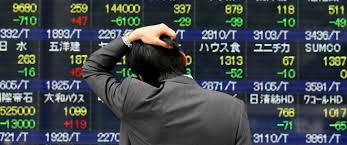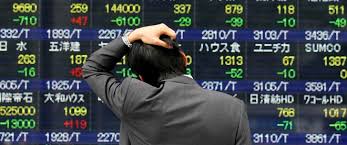
Japan's economy offered a glimmer of hope for policymakers struggling to end years of stagnation after the far eastern economic giant managed to wade off recession in the third quarter with the initial estimate of a contraction revised to an annualized expansion of 1.0 percent.
This recovery is being viewed as a success of ‘Abeonomics’ – the term given to premier Shinzo Abe's economic policy for Japan. The reason behind the recovery is an increased capital expenditure and is being welcomed as a positive sing for the government’s efforts to pressuring companies to invest more of their record profits to put Japan's economy on a sustained recovery path.
The data released considerably exceeded the median market forecast for 0.1 percent growth and the revision to 1.0 percent growth from the preliminary estimate of a 0.8 percent fall suggested that the world's third largest economy was in better shape than initially thought.
From a initially estimated 1.3 percent fall, capital expenditure was revised up to a 0.6 percent gain in July-September, Cabinet Office data showed on Tuesday.
"The data was a positive surprise for markets. It's a welcome one for us too. Companies are starting to implement their capital expenditure plans," Economics Minister Akira Amari told reporters.
It is expected that the Bank of Japan would hold off on additional easing even as inflation slides further away from its 2 percent target, analysts say, which has been helped by an easing of pessimism over the outlook by the latest data.
A slower-than-expected fall in inventory had amplified the upgrade as analysts caution against reading too much into the revision. A Fall in inventory is indicative of the fact that companies are struggling to sell goods in the face of weak demand.
"All in all, it's positive news for the economy, particularly the stronger-than-expected capital expenditure," said Yoshiki Shinke, chief economist at Dai-ichi Life Research Institute.
"But the big picture remains the same, which is that the economy is at a standstill," Shinke added.
It would have been termed technically as a recession if the economy had contracted for the third consecutive quarter as estimated initially. Recession is described as an economic condition when there are two straight quarters in which GDP has declined.
Policymakers will remain under pressure to speed up growth with additional stimulus measures even with revised data showing Japan dodged recession.
The economy barely grew in the first half of the current fiscal year when a 0.5 percent contraction in April-June is factored in. In order to meet the government's estimate of 1.5 percent growth in the year to March 2016, the Japanese economy needs to expand an annualized 3 percent each in the remaining quarters. This target was described by Amari as "quite ambitious."
Analysts say that a supplementary budget of more than 3 trillion yen ($24 billion) is likely to be compiled by the government that is expected to modestly boost the growth in the economy but which would not happen before April next year.
Due to the weak household spending and exports, many analysts are of the view that the economy would rebound only modestly in the current quarter.
However here was good news for the government as the country as the trade balance swung to a surplus and Japan posted a current account surplus for the 16th straight month in October, Ministry of Finance data showed on Tuesday.
The current account surplus stood at 1.46 trillion yen ($11.84 billion), up from a 846.4 billion yen surplus in October last year. The median forecast was for 1.66 trillion yen.
(Source:www.reuters.com)
This recovery is being viewed as a success of ‘Abeonomics’ – the term given to premier Shinzo Abe's economic policy for Japan. The reason behind the recovery is an increased capital expenditure and is being welcomed as a positive sing for the government’s efforts to pressuring companies to invest more of their record profits to put Japan's economy on a sustained recovery path.
The data released considerably exceeded the median market forecast for 0.1 percent growth and the revision to 1.0 percent growth from the preliminary estimate of a 0.8 percent fall suggested that the world's third largest economy was in better shape than initially thought.
From a initially estimated 1.3 percent fall, capital expenditure was revised up to a 0.6 percent gain in July-September, Cabinet Office data showed on Tuesday.
"The data was a positive surprise for markets. It's a welcome one for us too. Companies are starting to implement their capital expenditure plans," Economics Minister Akira Amari told reporters.
It is expected that the Bank of Japan would hold off on additional easing even as inflation slides further away from its 2 percent target, analysts say, which has been helped by an easing of pessimism over the outlook by the latest data.
A slower-than-expected fall in inventory had amplified the upgrade as analysts caution against reading too much into the revision. A Fall in inventory is indicative of the fact that companies are struggling to sell goods in the face of weak demand.
"All in all, it's positive news for the economy, particularly the stronger-than-expected capital expenditure," said Yoshiki Shinke, chief economist at Dai-ichi Life Research Institute.
"But the big picture remains the same, which is that the economy is at a standstill," Shinke added.
It would have been termed technically as a recession if the economy had contracted for the third consecutive quarter as estimated initially. Recession is described as an economic condition when there are two straight quarters in which GDP has declined.
Policymakers will remain under pressure to speed up growth with additional stimulus measures even with revised data showing Japan dodged recession.
The economy barely grew in the first half of the current fiscal year when a 0.5 percent contraction in April-June is factored in. In order to meet the government's estimate of 1.5 percent growth in the year to March 2016, the Japanese economy needs to expand an annualized 3 percent each in the remaining quarters. This target was described by Amari as "quite ambitious."
Analysts say that a supplementary budget of more than 3 trillion yen ($24 billion) is likely to be compiled by the government that is expected to modestly boost the growth in the economy but which would not happen before April next year.
Due to the weak household spending and exports, many analysts are of the view that the economy would rebound only modestly in the current quarter.
However here was good news for the government as the country as the trade balance swung to a surplus and Japan posted a current account surplus for the 16th straight month in October, Ministry of Finance data showed on Tuesday.
The current account surplus stood at 1.46 trillion yen ($11.84 billion), up from a 846.4 billion yen surplus in October last year. The median forecast was for 1.66 trillion yen.
(Source:www.reuters.com)





